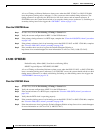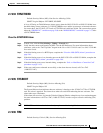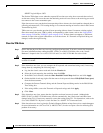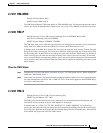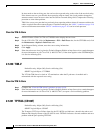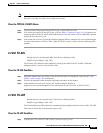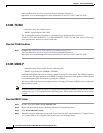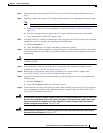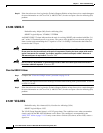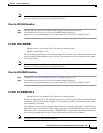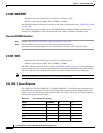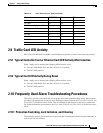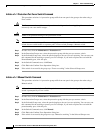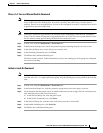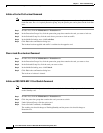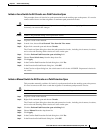
2-144
Cisco ONS 15310-CL and Cisco ONS 15310-MA Troubleshooting Guide, R7.0
Chapter 2 Alarm Troubleshooting
2.7.246 UNEQ-V
Step 13 If the alarm does not clear, log into the Technical Support Website at http://www.cisco.com/techsupport
for more information or call Cisco TAC (1-800-553-2447) in order to report a Service-Affecting (SA)
problem.
2.7.246 UNEQ-V
Default Severity: Major (MJ), Service-Affecting (SA)
SONET Logical Objects: VT-MON, VT-TERM
An SLMF UNEQ VT alarm indicates that the node is receiving SONET path overhead with Bits 5, 6,
and 7 of the V5 overhead byte all set to zeroes. The source of the problem is not the node raising the
alarm, but the node transmitting the VT signal to it. The V in UNEQ-V indicates that the failure has
occurred at the VT layer.
Warning
Invisible laser radiation could be emitted from the end of the unterminated fiber cable or connector.
Do not stare into the beam directly with optical instruments. Viewing the laser output with certain
optical instruments (for example, eye loupes, magnifiers, and microscopes) within a distance of
100 mm could pose an eye hazard.
Statement 1056
Warning
Use of controls, adjustments, or performing procedures other than those specified could result in
hazardous radiation exposure.
Statement 1057
Clear the UNEQ-V Alarm
Step 1 Complete the “Clear the UNEQ-P Alarm” procedure on page 2-142.
Caution Always use the supplied electrostatic discharge wristband when working with a powered ONS 15310-CL
or ONS 15310-MA.
Step 2 If the alarm does not clear, log into the Technical Support Website at http://www.cisco.com/techsupport
for more information or call Cisco TAC (1-800-553-2447) in order to report a Service-Affecting (SA)
problem.
2.7.247 VCG-DEG
Default Severity: Not Alarmed (NA), Non-Service-Affecting (NSA)
SONET Logical Object: VCG
The VCAT Group Degraded alarm is a VCAT group alarm. The condition occurs when one member
circuit carried by the ML-100T-8 Ethernet card is down. This condition is accompanied by the
“OOU-TPT” alarm on page 2-112. It only occurs when a Critical (CR) alarm, such as LOS, causes a
signal loss.



